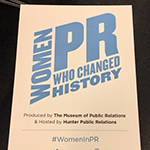 |
The hurdles crossed, and barriers broken by the first generation of women to work in the public relations industry were the subject of “PR Women Who Changed History,” an event sponsored by the Museum of Public Relations on Thursday.
Hunter Public Relations CEO Grace Leong took the stage to introduce the event’s keynote speaker, former AT&T CCO Dick Martin, who talked about the life of the late Marilyn Laurie, AT&T’s first female CCO. “Martin actually worked for Marilyn Laurie,” Leong told the crowd. “Most people might think that Marilyn Laurie followed him. But Dick wants to remind everybody that he followed a woman.”
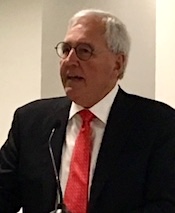 Dick Martin |
In his remarks, Martin noted some of the many lessons that Laurie taught him. “She approached issues from surprising angles that kept her from myopically focusing on the obvious and allowed her to see around the next corner,” he said.
“Marilyn knew exactly how she could help in every job she had,” Martin added. “And that's exactly what she did. In her own way, largely through the example she set, she did change history.”
Martin also speculated on how Laurie might have responded to the #MeToo and #TimesUp movements currently sweeping the country. He told the audience: “I can’t believe I'm saying this, but I think on #Metoo and #TimesUp, Marilyn would have come to the same conclusion as Steve Bannon who said, ‘#Metoo is not just sexual harassment. It’s an anti-Patriarchy Movement. It’s going to undo ten thousand years of recorded history.’”
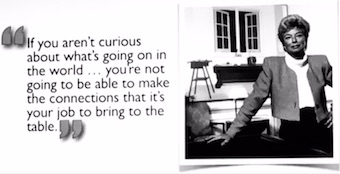 Marilyn Laurie's philosophy of PR |
Following Martin’s talk, there was a panel discussion moderated by Baruch College professor Caryn Medved. The panelists were Hunter PR founder Barbara Hunter, National Organization for Women founder and longtime PR exec Muriel Fox and Saralie Slonsky, who held executive positions at Burson-Marsteller and Cohn & Wolfe.
Hunter talked about how different everything used to be for women, right down to how they were expected to dress for work. "When I went to work, I would put on my hat, often with a veil, my white gloves, and my high heeled shoes and go into the subway to go to work,” she said. “When I got there, I would deal with carbon paper and mimeograph machines.”
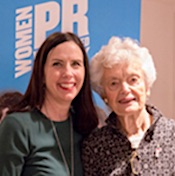 Hunter PR CEO Grace Leong and agency founder Barbara Hunter |
She also remembered how few women there were in the field back them. “I would go to a PRSA luncheon, they were held at the Waldorf at that time. There might be a hundred and fifty men and maybe ten women.”
Fox talked about the fact that women were always steered toward jobs that were deemed suitable for them. “A lot of young women don't recognize that in those days they had help wanted ads. The help wanted ads said, help wanted male, help wanted female,” she said. “And that was really the first big cause that NOW took on in 1966. It was a very tough fight, but of course, we won.”
Fox acknowledged that even she was not immune from having a narrow view of the options possible for many female workers. “I’m going to use this occasion to apologize to Saralie Slonsky,” she said about her fellow panelist. “She was my secretary.”
“What I apologize for,” she noted, “is that we took it for granted that she was going to remain a secretary and there were just no secretaries who moved on. I came in as a writer and a former reporter. In those days, it was just impossible, and she had to go to another agency which appreciated her.”
Slonsky saw Fox’s behavior in a more positive light, saying that Fox “taught me so much that I was able to move on.”
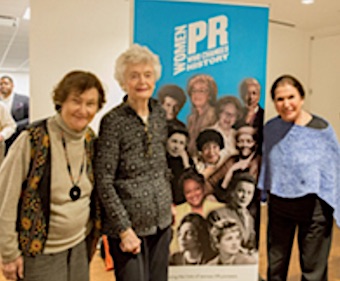 Left to right: Saralie Slonsky, Barbara Hunter, Muriel Fox |
Medved asked the panelists to talk about the biggest hurdle each faced as they worked their way up in the business.
Hunter brought up the difficulty of juggling work and family. “I remember when I was with National Dairy at one time, as a publicist. I left to have a baby. They said, oh we'll hold your job for you. I came back a month later, and there was no job.”
That problem was still evident when she moved to a small PR agency run by two women. “I remember one night being called in after work and they're complaining to me because I left the office at five thirty, even though my work was done and why didn't I stay till eight or nine o'clock like they did. I said, ‘I have a small baby at home. I have another responsibility.’ So, I think that is something you have to deal with as women.”
Fox mentioned the stereotypical view of women that most of their male colleagues had: “I remember the head of ABC News, a very nice guy, said to me once, just matter-of-factly, ‘Well, you know women can’t be bosses because women can't give orders. It took a very long time to show that women could be bosses.”
Slonsky said that when she started to work for Fox, “she really helped me to understand that you can be a woman, be an executive and still be a person.”
Slonsky, who now teaches communications to college students, said the differences between advertising and PR inadvertently opened a door for women. “Advertising was more for the men,” she said. “And so, women began to do public relations. That was kind of a little bit difficult for a while. But I think now that it doesn’t matter whether you're male or female. Now it really matters what you know and how you do it.”


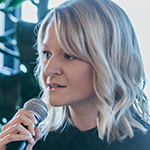 “The Value of PR” was the theme of this year’s Communications Week, which included events in New York, Chicago, London and Germany that ran from Oct. 14 to 18.
“The Value of PR” was the theme of this year’s Communications Week, which included events in New York, Chicago, London and Germany that ran from Oct. 14 to 18.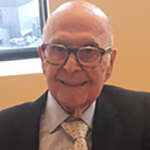 Harold Burson's passion for client service, insatiable curiosity, humility and rock solid values are why the Memphis native is a PR legend, said Pat Ford, ex-vice chairman of B-M, at last night's unveiling of the Museum of Public Relations' collection of papers and mementoes of the 98-year-old executive. (2 reader comments)
Harold Burson's passion for client service, insatiable curiosity, humility and rock solid values are why the Memphis native is a PR legend, said Pat Ford, ex-vice chairman of B-M, at last night's unveiling of the Museum of Public Relations' collection of papers and mementoes of the 98-year-old executive. (2 reader comments)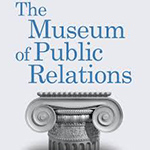 Musem of Public Relations celebrates some of the industry's first female leaders... IPR is hosting 2019 Bridge PR and Communications Conference in April... USC Annenberg event to look at the future of technology in communications.
Musem of Public Relations celebrates some of the industry's first female leaders... IPR is hosting 2019 Bridge PR and Communications Conference in April... USC Annenberg event to look at the future of technology in communications.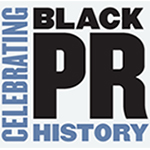 Museum of PR slates fourth annual BlackPRHistory event on Jan. 30... Slate PR partners with GLADD in presenting annual awards gala May 4 in NYC... New York Women in Communications schedules career change session Jan. 31.
Museum of PR slates fourth annual BlackPRHistory event on Jan. 30... Slate PR partners with GLADD in presenting annual awards gala May 4 in NYC... New York Women in Communications schedules career change session Jan. 31.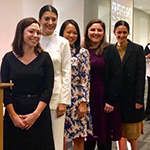 Five rising stars in the communications industry were honored at the sixth annual New York Women in Communications "WiCi Awards” ceremony.
Five rising stars in the communications industry were honored at the sixth annual New York Women in Communications "WiCi Awards” ceremony. 


 Have a comment? Send it to
Have a comment? Send it to 
No comments have been submitted for this story yet.